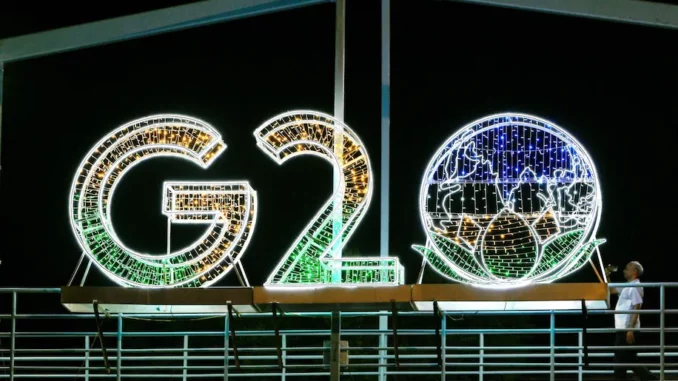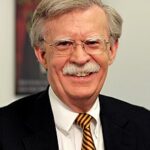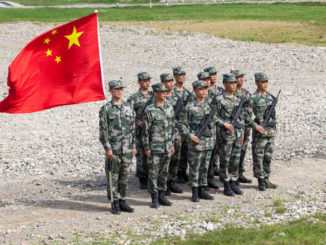
Eliminating G-20 meetings would free up the leaders’ time to focus on real issues, not diplomatic niceties
“Consider what gave real impetus to the annual G-20 process, the 2008 financial crisis. In November 2009, with his history a little shaky, incoming European Council President Herman Van Rompuy (a former Belgian prime minister) proclaimed 2009 to be “the first year of global governance, with the establishment of the G-20 in the middle of the financial crisis. The climate conference in Copenhagen is another step toward the global management of our planet.” One can only imagine how many Americans remain unaware of the G-20’s role in global governance, much less agree that there should be global governance or a G-20 role in it.”

The annual Group of 20 festivities, this year in India, are now concluded. It is appropriate to ask exactly what these gatherings accomplish. For the process-obsessed, every international meeting among heads of state or diplomats is positive, regardless of whether anything concrete is achieved. The G-20 exemplifies this misconception. Mountains of final communiqués, joint statements and outcome documents have contributed to global deforestation but little else.
Moreover, leaders’ summits are preceded by endless cabinet-level meetings: foreign ministers, treasury ministers and environmental ministers, all producing rivers of deathless prose. Who remembers, though, the ringing declarations of last year’s G-20 gathering in Bali, much less those of previous years?
Consider what gave real impetus to the annual G-20 process, the 2008 financial crisis. In November 2009, with his history a little shaky, incoming European Council President Herman Van Rompuy (a former Belgian prime minister) proclaimed 2009 to be “the first year of global governance, with the establishment of the G-20 in the middle of the financial crisis. The climate conference in Copenhagen is another step toward the global management of our planet.” One can only imagine how many Americans remain unaware of the G-20’s role in global governance, much less agree that there should be global governance or a G-20 role in it.
Van Rompuy’s job helps explain the global-governance mind-set, which infects the G-20 and other international “institutions.” The European Council consists of European Union heads of state or government. Its presidency once rotated every six months among the members, until the Treaty of Lisbon created a 30-month presidential term, renewable once. Van Rompuy was the first president so elected, making him in E.U. eyes equivalent to the president of the United States. Fancy that. No wonder he was qualified to speak of global governance.
Many originally saw the G-20 as a broader alternative to the global West’s Group of Seven, comprising the world’s largest industrial democracies. The G-7 itself has had its ups and downs. For example, it became a G-8 by adding Russia, but Moscow’s inconvenient 2014 Ukraine invasion resulted in its expulsion. It was the G-7’s weak response in 2014 and later, reflecting the West’s collective failure to punish Russia, that undoubtedly emboldened Moscow to invade Ukraine even further last year. The attack galvanized the G-7, surprisingly, more than anything in several decades.
By contrast even to the G-7 herd of cats, the G-20 has been feckless. Because the group includes Russia and China, its final joint statement in India contained only an anodyne comment on Russia’s unprovoked aggression against Ukraine, even weaker than its 2022 statement. Every G-20 member holds veto power over a consensus leaders’ statement, so it should be no surprise that nothing much happened this weekend in New Delhi, as in the United Nations Security Council, where Russia and China also hold veto power.
When asked to justify the G-20, supporters invariably say it provides a useful platform for members to confer bilaterally outside the larger meeting. It is true the G-20 enables this diplomatic version of speed dating, but so do any number of other forums, not least the U.N. General Assembly’s opening next week in New York. The real question is whether endless rounds of brief encounters have any measurable utility.
President Biden’s Friday meeting with Indian Prime Minister Narendra Modi derived nothing from being attached to a G-20 gathering. The meeting could have important consequences, as could Biden’s announcement of new rail and shipping connections among India, the Middle East and Europe. But it could just as easily have taken place, and perhaps with even greater media coverage, during a stand-alone visit by the U.S. president. Biden’s second stop on this trip, Vietnam, was also strategically correct — and was enhanced by his not being surrounded in Hanoi by a small mob of other world leaders.
Many observers correctly noted that the absences in India of Russia’s Vladimir Putin and China’s Xi Jinping gave Biden a solo opportunity to make America’s case on key issues. But there is substantial reason to think China and Russia simply don’t value the G-20 as much as other forums. Putin hasn’t attended since the 2019 G-20 in Japan (2020 being a virtual summit for all because of the pandemic). Xi skipped 2021 (beaming in only by video) as well as this year. If the G-20 were so important, it is inexplicable that Xi chose not to make even a brief appearance, especially in India, where his absence is being taken as a slap in the face.
It takes nothing away from India, and its extensive preparations for this G-20, to emphasize how evanescent these meetings are. In international affairs, pretending is not a sound basis for policy. Eliminating G-20 meetings would free up the leaders’ time to focus on real issues, not diplomatic niceties.
(John R. Bolton served as national security adviser under President Donald Trump and is the author of “The Room Where It Happened: A White House Memoir.”)
(First published in Washington Post)





Be the first to comment